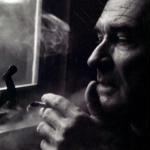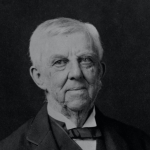Ce qui est beau à Leningrad, c’est Saint Petersbourg.
What fellow traveller returned from the U.S.S.R.,
Burdened with souvenirs in the form of second thoughts, said
That, rephrasing the Slavic platitude as a reactionary epigram? Thence
One must count oneself privileged to have escaped empty-handed,
Frisked in exit by the incompetent customs of the country
Who got everything backwards, inspecting my papers with a glass:
Bourgeois formalism apart, my handwriting looks like a decadent cipher.
“Chto eto?” The pocket epic or this wordy verse? “Poezia.”
Insisting it scans as prose they confiscate War and peace:
The classic comeback: loved her, hated him, your eponymous warhead
In gremium qui saepe se reicit aeterno devictus vulnere amoris:
Even apologists for free love must confess this pair legally
Wed, a union no sentimental do-gooder likes to solemnize.
V., I’m afraid the authorities took away your name
Which they found in my notebook. Asked who you were,
I said, “Someone I met in a restaurant.” Not so:
You were a pick-up of sorts on Nevsky Prospekt
Where as I puzzled over a plan filched from Intourist
That first evening you appeared eager to be of help.
In exchange for a few verbatim tips on english idiom
(“Tell me, please, is it better, ‘Here you are!’ or
‘There it is!’ ”) you afforded me a smattering of Russian—
Dom, dub, tsat, eima dvorets, knigi, mir, ya ne ponemayu,
House—oak—garden—winter-palace—books—world—I don’t understand—
And your jealous services as a guide to the environs
When you were “free from class”. Unlike the other touts,
Official and unofficial, who besieged the foreigners’ hotel, you never
Asked for cigarettes or dollars nor offered girls or watches,
But wanted books and talk. Whether you were an agent
I am not absolute. If so, it doesn’t figure.
Who sold me “art treasures” to take out, a nickel
Samovar and the biscuit bust of Pushkin, price two rubles,
From that popular Thrift Shop where one bought antiques, the
Only place in Leningrad to find silverware, glass, or china,
As department stores seemed to stock nothing but plastic gimcracks?
Enough economics—unless I just mention in passing the maids
At the hotel, patriots whom I detected to be helping
Themselves to my dwindling whisky. When I locked it up
One morning, on my return I found the bed unmade.
Still there are things I want to ask you, V.
Are you in prison or power? Were you really interrogated
As you foretold if you were seen with me? Paranoid
Melodrama I supposed, yet daily life in never-never land.
You warned me one was followed, watched, suspected, bugged, betrayed
As a matter of course, and there were certain places
We mustn’t be seen together in public, like divorcées.
Out of bounds to you the doldrums of the Europa.
Every day you used to suggest some novel rendezvous
Where until you materialized no one was in evidence.
Dialectics make impossible bedfellows. Are you today the interrogator
You once were, inexhaustible in futile questions of American usage?
Following a call at the single synagogue, where we tapped
The anti-semitic party line, you invited me back for
A supper of black bread, sausage, and sweet white wine.
No English on the stair or in the common hallway
You cautioned, but your student’s room itself was an asylum,
With an encyclopaedia, your father’s paintings, a dusty grand piano
(“I was used to play.”), and the telephone. “Talk now!”
The couple embracing in the entrance, were they also spies?
What circuitous routes we pursued in our innocent sight-seeing,
How vast the meander of the stone Hermitage which holds
A pictorial history of pillaged Europe, where the fat, satisfied
Intelligent bust of the Holstein Messalina smirks from its pedestal,
As at Tsarskoe Selo, which the present regime calls Pushkin.
There, amid monumental, autumnal ruin, in a neo-gothic folly,
Lunching on lard, I learned the Russian word for cosy,
Oiutny: neither Pavlovsk, that meticulously restored memorial to filial resentment
Nor Peterhof’s post-war proletarian Renaissance trick pavilions quite qualify.
I go on like a guidebook, there being none such.
Nowhere could we find a Russian-English, English-Russian dictionary
Or maps less rudimentary than those of a vanished century.
Lies appropriately describe this sequestrated Czarist capital founded on water,
Edifice of pure will and an idea, double-glazed window
Closed on the West. The past lingers along the Neva
Like a revisionist prince: pink, green, ochre, robin’s-egg-blue
Italianate confectionery on a Scythian scale. You wanted to know
Why all foreigners are so fascinated by palaces and churches
Used as cinemas and baths? Our taste is counter-revolutionary.
Just fancy playing Soviet monopoly or enduring social-realist monotony!
And having nothing to read but Lenin and Jack London
Unless in samizdat! I am unable to appreciate a solitary
Line of Russian verse in translation, from Bogan to Brodski.
Although, like Leningrad at the same time fantastic and prosaic,
Your novels form a sort of exotic province of English,
I don’t know why, inimitable Pushkin is a noted bore.
But who came here to talk about literature? The night
Before leaving I invited you to squander my last vouchers
Somewhere they, and we, would be accepted at face value:
After two helpings of chicken you ordered another, of veal.
Russkaya dusha! What if we were brothers? Haven’t men
More in common than their wants, such as language, a
Skeleton key rattled in so many locks? With all utopias,
The farther from perfection the better; this future that works
Looks so old-fashioned and unkind. Although the masses may
Be content, unhappy, or indifferent, excellence is an individual gesture.
Malice, too, is personal. The destroyer Aurora opposite Intourist’s incongruous
Glass prison, her heroes liquidated, will she ever lift anchor
For the free world? Here, perhaps better dead than read,
Instead of the Concise Oxford Dictionary you wanted, this letter.




















Comment form: